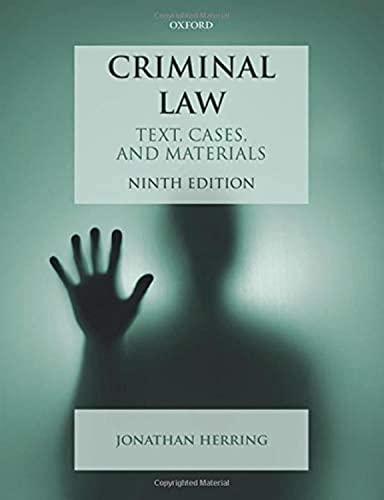Question
1. reply to the comment below. Say why you agree I selected the podcast, Interrogating Government Employees. I found the podcast to be very interesting
1. reply to the comment below. Say why you agree
I selected the podcast, "Interrogating Government Employees." I found the podcast to be very interesting because it discussed how government employees are to be interrogated so, their 5th Amendment right is not violated. Steve and Jenna, the hosts of this podcast and both government employees, discussed how hard it is to not cross the line of distrusting government employees when they choose not to be questioned about a case they are a part of or when they are suspected of a crime. There are two rules that they talked about in the podcast which are, Garrity and Kalkines. Garrity is a rule to be used on a suspect before questioning them. An officer uses this rule when the government employee being interrogated has objective reasonable belief that they could be disciplined or fired for not cooperating and it is foreseeable that the information from the employee can be used to prosecute them criminally. The Kalkines rule is used when the employee has no valid 5th Amendment privilege. The statements the employee will make are required for the case so, any statements the employee makes are not to be used against them criminally. If the employee does not cooperate to the questioning they can be fired for not cooperating since, they have no 5th Amendment privilege. After reading the manual the two rules I read in the manual that regard Miranda Rights are policy 306.3 and 306.3.3. The policy 306.3 is important because it talks about how to know if you should detain someone. Some factors to take into account when detaining someone is their age, health, disabilities, and mental conditions. This regards Miranda because it mentions how to take care of a suspect that is to be arrested for a crime. The next rule is 306.3.3 and this regards how to detain juveniles. The manual says to not detain juveniles unless, the officer has reasonable suspicion that the juvenile may resist, escape, or injure themselves or the officer. This regards Miranda because juveniles who are detained deserve their rights to not be taken away.
2. reply to the comment below. say why you agree
The term "Miranda rights" refers to a type of warning that police officers generally provide to criminal suspects who are being held by the police. This warning informs the suspects of their right to remain silent and, in effect, their protection from being forced to testify against themselves. This means they are free to decline to answer questions or provide information to police or other officials. This warning aims to protect the admissibility of their deposition testimony in subsequent criminal proceedings. This term, however, only came to be after an incident in 1966. According to the FLETC Talk on Miranda v. Arizona, On March 13, 1963, Ernesto Miranda was detained at his home and taken to the police station, where he was questioned by authorities in connection with a kidnapping and rape. Miranda provided a written confession after two hours of interrogation. Despite the defense counsel's objections and the fact that the police officers admitted that they had not informed Miranda of his right to have an attorney present during the interview, the written confession was entered as evidence at trial. Miranda was found guilty by the jury. After the case was seen by the Supreme Court, they concluded that the defendant's interrogation violated the Fifth Amendment and reversed his conviction. This case set a precedent that requires that law enforcement officials advise suspects of their right to remain silent and to obtain an attorney during interrogations while in police custody. The Clovis Police Department Policy Manual highlights Miranda warnings several times. Policy 368.12 Investigative Field Interviews, requires that Miranda warnings be provided to suspects in their primary language by an authorized interpreter or, if the suspect is literate, by providing a translated Miranda warning card. This is important in making sure everyone is equally aware of their rights, and that the conversation being held is understood by both parties. Policy 324.13 Interviewing or Interrogating Juvenile Suspects, states that a juvenile should not be interviewed or interrogated unless the juvenile has the apparent capacity to consent and consents to the interview or interrogation. An officer must let a child 17 years of age or less consult with legal counsel in person, by phone, or by video conference before conducting a custodial interrogation, including the waiving of Miranda rights. The minor may not waive the consultation. This is important in ensuring that Juveniles have added protection and their counsel is aware of all actions being taken.
Step by Step Solution
There are 3 Steps involved in it
Step: 1

Get Instant Access to Expert-Tailored Solutions
See step-by-step solutions with expert insights and AI powered tools for academic success
Step: 2

Step: 3

Ace Your Homework with AI
Get the answers you need in no time with our AI-driven, step-by-step assistance
Get Started


